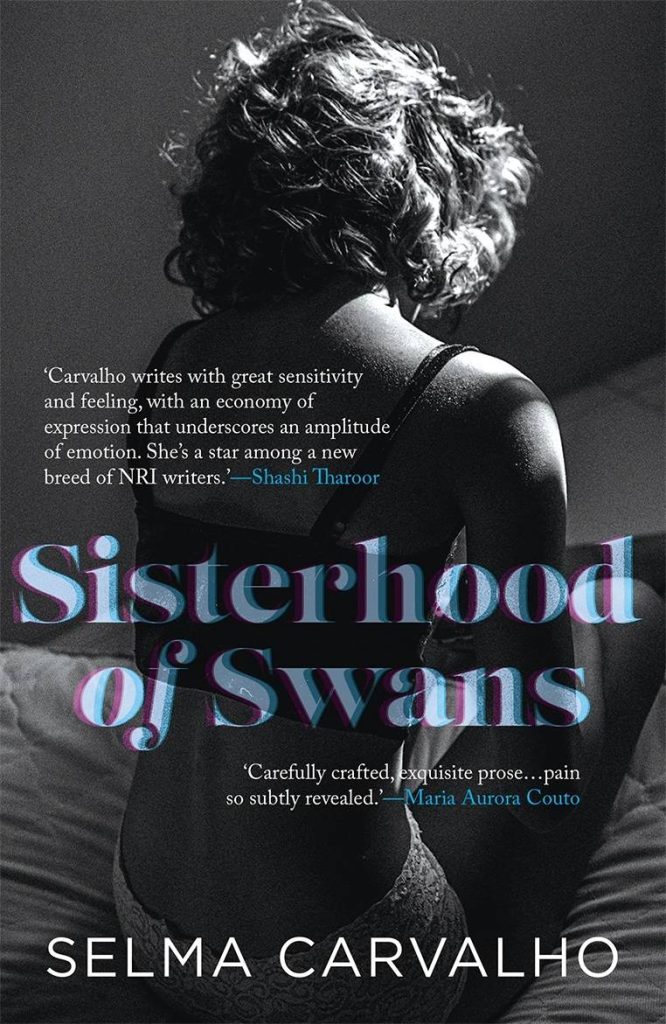Adding that though she cannot speak to the universality of womanhood, by and large, women still yearn for a mate with whom they’ll find fulfilment… Selma Carvalho speaks with Sukant Deepak
For a long time, the idea of a woman in early adulthood making disastrous decisions had been knocking in her head. The scene where Anna-Marie and Sanjay are waiting at the bus stop and Anna-Marie decides to go home with him is the genesis of the book. “Perhaps people can relate to the base instinct which informs our desires,” she smiles.
There is a conscious style at play that comes effortlessly in the book. There is a certain trust in the reader to understand the radical acts that seem so effortless. In British-Asian Selma Carvalho’s exquisite fiction ‘Sisterhood of Swans’ (Speaking Tiger) brimming with emotion, and not just experience, somewhere exists an invisible gravity abyss you cannot resist.
This may be Carvalho debut fiction work, but even her non-fiction floated in a lyrical style. “Most Goan histories emerge from academics, as they should, where the writing is often dense. I wanted to write accessible narratives about my particular area of research which is the Goan presence in colonial East Africa,” she tells and credits writer Maria Aurora Couto, who took her under the wing and encouraged Carvalho to venture into fiction.
Believing that the short story is the gateway form into literary writing as it allows one the opportunity to hone one’s craft and validates the writer fairly quickly, she remembers being consistently shortlisted in literary contests in the UK, to the point where she had about forty-odd long/short listings on my writer’s bio.
“The publishers of this book acquired the rights to my collection of short stories which had been a finalist for the SI Leeds Literary Prize. They then encouraged me to write a novel. Sisterhood of Swans is my first long-form publication,” she says.
Adding that though she cannot speak to the universality of womanhood, by and large, women still yearn for a mate with whom they’ll find fulfilment.
“‘We belong to the sisterhood of swans seeking to pair for life our species is doomed to disappointment.’ The second line from where the title emerges is the more telling line. Given the complexity of the human condition, a soulmate or even a long-term mate is often a fiction of the imagination. Human relationships are complex organisms with a myriad of conflicting desires. Long-term monogamy is a many-tentacled monster,” she says.
Even though she has lived in the United States for several years, and now in the UK for almost fourteen years, the author says she essentially belong to the Arabian Gulf diaspora, which doesn’t allow for any sense of citizenry. Thus, she grew up within a Goan milieu, always with Goa as her centripetal location, and yet from infancy informed by the diversity which prevails in the Gulf.
“I wanted to create characters very different from the tropes that occur in Goan literature, typically the bhatkar (landed gentry) pitted against the mundkar (tenant/underdog). I wanted to write about modern characters, women who are university-educated feminists and men who are charming cross-cultural philanderers. These characters live within the canon of Goan literary endeavour but exist universally.”
Ask her who is Carvalho essentially– fiction or non-fiction, and she feels that both are disciplines of discovery. Adding that while a lot of documentation of Goan history and culture has to take place in order for it to survive as a record of their collective narrative, she says, “In the past five years, the old guard of Goa’s intelligentsia has been fading and it’s time for my generation to carry the baton. I feel a tremendous responsibility to be in the service of my state, to chronicle and document, and so I find myself returning to this process as a moral obligation.”

Carvalho’s first book ‘Into the Diaspora Wilderness’, which was published 12 years ago by the independent press Goa, 1556, founded by the journalist Frederick Noronha, laments, “There’s a vile literary hubris that dismisses independent publishers which is ironic, given their role in discovering Booker prize listees, preserving regional histories, and works in translation.”
Having finished writing new novels, ‘Horton’ and ‘And Thus to All Tyrants’, which explore relationships, truth-telling, and the immigrant as the ‘other.’, she has started on a non-fiction book titled, Goans of Zanzibar, 1865-1910.
ALSO READ-‘When one paints first, what emerges is evolution’

Leave a Reply